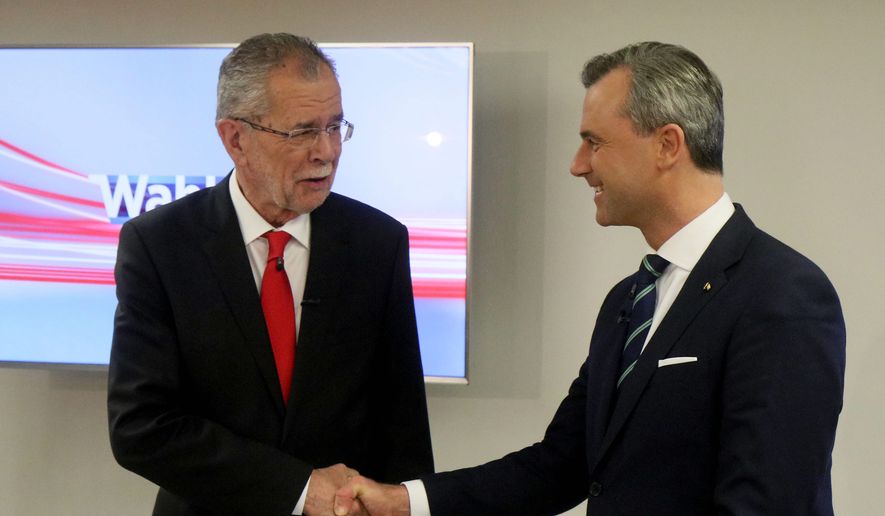VIENNA — In one of the first electoral tests on the continent since the Brexit and Trump political earthquakes, Austrians are slated to go to the polls Sunday — for the last time, they hope — in a rerun of a presidential election that pits a far-right populist against a left-wing independent.
Regardless of who wins, the president-elect for the first time will not come from either of the country’s two main centrist parties that have dominated the tiny Alpine nation’s politics since the end of World War II, suggesting that Austrian voters — like their American and British counterparts — are sick of their traditional political elites and ready for something radically new.
The faceoff is between Norbert Hofer, 45, of the euroskeptic, anti-immigration Freedom Party founded by former Nazis in 1955 and Alexander Van der Bellen, 72, a soft-spoken economics professor and former Green Party chairman whose candidacy is not affiliated with the party.
Despite the wide disparity in the candidates’ views, polls suggest the election is too close to predict, reflecting a conflicted electorate as well as widespread political disillusion.
He hasn’t exactly promised to make Austria great again, but Mr. Hofer has run on many of the issues in Donald Trump’s campaign: a distrust of elites and economic globalization, the need to control borders and tighten immigration policies and the threat to national identity, especially from the growing ranks of Muslim immigrants.
Mr. Hofer’s proposals are similar to those floated by other populists around the world. But it’s a toss-up as to how Britain’s decision to leave the European Union in June and Mr. Trump’s win across the Atlantic will alter Sunday’s vote, said Austrian political analyst Stefan Sengl.
“It is clear that Hofer voters feel emboldened,” he said. “But on the other hand, a lot of Van der Bellen voters learned their lesson from the U.S. election, so it is hard to say who is motivated more by Trump’s win.”
If Mr. Hofer is victorious, a far-right head of state would preside over a European country for the first time since the defeat of Nazism. Mr. Hofer couldn’t enact radical reforms because Austria’s presidency is largely ceremonial, but the post still wields some far-reaching powers, including the right to dissolve parliament and fire the chancellor and the Cabinet.
The vote could prove an appetizer for a momentous 2017, when both Germany and France will be holding presidential elections.
Many are already noting parallels with the U.S. presidential race, in which Mr. Trump’s populist revolt against Washington elites triumphed even though polls showed him trailing going into the election. As in the U.S., voter enthusiasm appears to be clearly on the side of the anti-establishment candidate.
“As in the USA, one voting bloc — those supporting Hofer — are very emotionalized and know exactly why they are voting for him,” Salzburg University political scientist Reinhard Heinisch told the German news service Deutsche Welle. “On the other hand, many of those voting for van der Bellen are just voting against Hofer.”
Some voters say they are wary of a Hofer presidency.
“I voted and will vote again for Van der Bellen because for me he is the only alternative,” said Alexander Forstner, a musician from Austria’s second-largest city of Graz. “The complex national and global challenges we are facing will not be solved with oversimplified answers and accusations toward different minorities.”
Troubled vote
The election marks the third time Austrians have gone to the polls since April, when Mr. Hofer won 35 percent of the vote in the first round of voting and Mr. Van der Bellen came in second, an upset that knocked the country’s two historically dominant parties, the center-left Social Democrats and the mainstream conservative Austrian People’s Party, out of consideration. In the runoff a month later, Mr. Van der Bellen won by a razor-thin margin.
But Mr. Hofer filed complaints alleging that some postal votes were mishandled, a challenge that led the country’s highest court to overturn the vote. A rerun was set for Oct. 2, but then red-faced election officials announced they wouldn’t be able to hold the vote because of insufficiently sticky adhesive strips on absentee ballots, making them susceptible to tampering. The election was eventually scheduled for Dec. 4.
The situation was so unprecedented that parliament had to pass special legislation to allow for the delay, which many viewed as a farce that degraded democracy.
The chaos emboldened supporters of Mr. Hofer, whose candidacy was riding high on widespread dissatisfaction over a refugee crisis. More than 1 million Syrians, North Africans and others fleeing war and poverty have flooded into Europe in the past two years.
“The president should be there for his own people. We can take in people, but there should be an end to this at some point,” said Harald Huber, a Hofer supporter in Vienna.
Some 90,000 refugees applied for asylum in Austria last year, the second-highest in the European Union on a per capita basis. The influx has strained social services, sparked security fears and triggered a xenophobic backlash. A recent survey found that the number of attacks on Austrian refugee centers was projected to double this year.
“I can understand people right now. They want to be taken seriously with all their fears,” said Vienna-based videographer Christopher Herndler. “These fears come mostly from misinformation and falsehoods in the media that display the refugee crisis in the wrong light. But if Van der Bellen fails to address these fears, Hofer will win.”
Mr. Hofer has said Islam is incompatible with Austria and has described the European Union’s open-door policy toward refugees as a major mistake. He has promised to strive to improve relations with Russia and to push for an Austrian exit from the European Union — an “Oxit,” in reference to “Osterreich,” the name of the country in German — if the bloc starts consolidating more power in Brussels and if Turkey gains membership.
“Islam is not a part of Austria,” Mr. Hofer said this week at a conference on anti-Semitism that featured Rafael Eitan, 90, the Israeli Nazi hunter who brought Adolf Eichmann to justice. “By the year 2050, 50 percent of the children in Austria younger than 12 will be Muslims. The kind of politics that is permitting a changing face of Austria and Europe has to be opposed.”
Mr. Trump’s rhetoric has made it easier for supporters on both sides to demonize each other, said Mr. Sengl. The more confrontational climate benefits critics of mainstream parties, he said.
“One thing that it has done is lower the level of political culture. People are now saying, ‘If this is what the president-elect of the United States can say and do, then these sorts of statements and policies are acceptable,’” Mr. Sengl said. “In the midterm, Trump’s win will motivate populist parties across Europe.”
Mr. Van der Bellen has warned that electing Mr. Hofer would add momentum to the growing chorus of right-wing politicians on the continent seeking to dismantle the European Union.
“The Austrian Freedom Party has been toying with Austria’s exit for 20 years,” he said during a televised presidential debate against Mr. Hofer on Tuesday. “Many politicians in Europe are worried that the mere speculation about Oxit could trigger an avalanche of right-wing populism. The most important thing is the solidarity between [EU] member states. Otherwise, we won’t be able to assert ourselves in the face of Russia or the United States.”




Please read our comment policy before commenting.